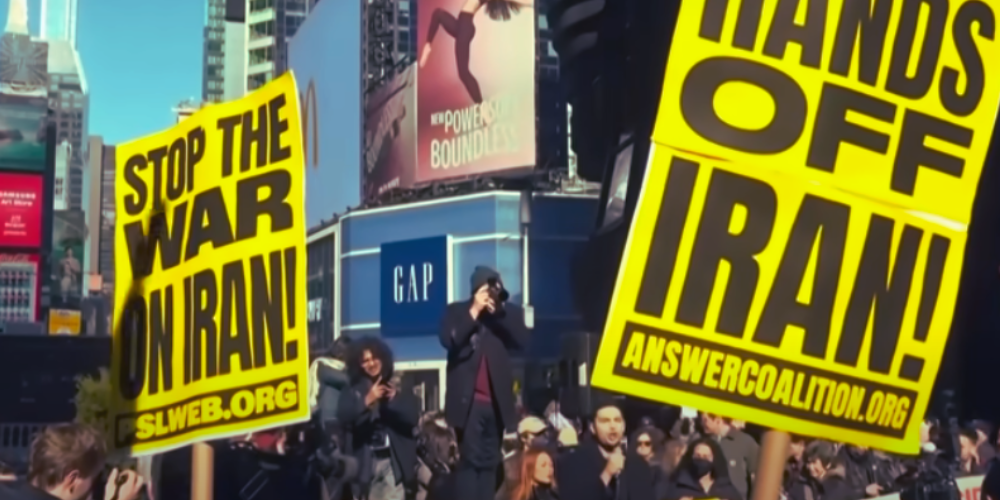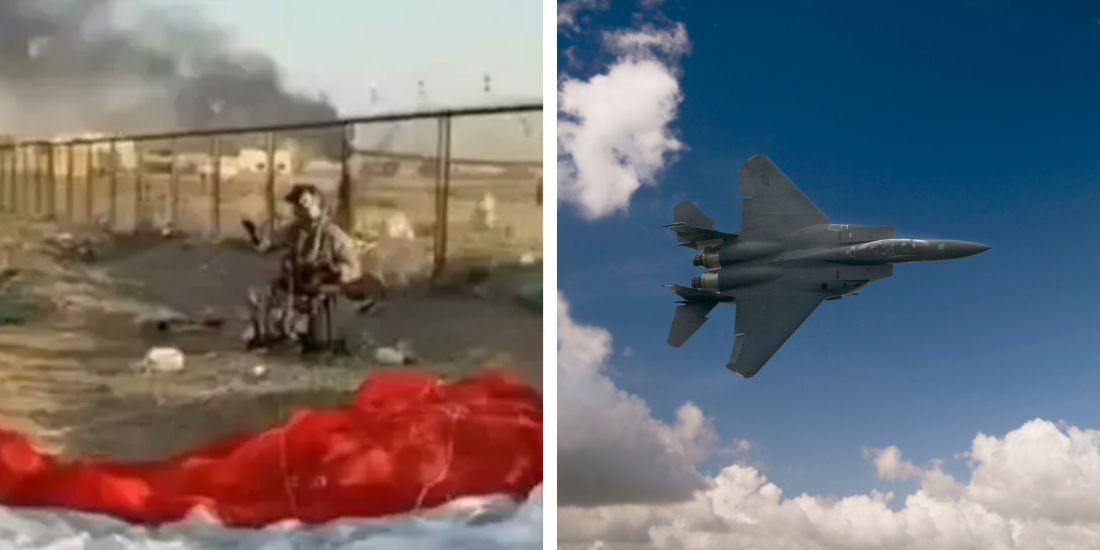House Minority Leader Nancy Pelosi (D.-Calif.) claimed this week she had not heard the stated position of Minority Whip Steny Hoyer (D.-Md.) that it would be a disaster for U.S. troops to withdraw from Iraq—a position that sharply contrasts with her own call for U.S. troops to be removed within six months.
In a written statement released November 30 following President Bush’s speech on the Iraq War at the U.S. Naval Academy, Hoyer said: “I believe a precipitous withdrawal of American forces in Iraq could lead to disaster, spawning a civil war, fostering a haven for terrorists and damaging our nation’s security and credibility. I still believe we can—and that we must—achieve success in Iraq.”
The stark difference between Hoyer’s position and Pelosi’s has been noted in a front-page story in her hometown newspaper, the San Francisco Chronicle, as well as in the Washington Times, the Washington Post, on CNN and on ABC.
But when I asked Pelosi directly to comment on Hoyer’s remarks, she claimed to be ignorant of them, and retreated behind the Democrats’ latest catchword on Iraq: “redeployment.”
Democrats discovered that advocating a U.S. “withdrawal” would fail when the House voted 403 to 3 on November 18 to reject a resolution calling for immediate withdrawal. (The resolution was sponsored by conservative House Armed Services Chairman Duncan Hunter, a California Republican, as a challenge to Democrats after Democratic Rep. Jack Murtha called for U.S. troops to be removed.) Since then, many Democrats have been using the term “redeployment” instead. Here are my exchanges with Pelosi and some other Democrats on the issue.
Madam Leader, Steny Hoyer said withdrawal from Iraq could be a disaster.
NANCY PELOSI (D.-Calif.): I’m sorry who?
Mr. Hoyer. He said withdrawal from Iraq could be a disaster leading to civil war and fostering a haven for terrorists. Do you agree with that statement?
PELOSI: I don’t know the context in which Mr. Hoyer made that.
It was on CNN last week.
PELOSI: I don’t know. I was busy last week. I don’t know the statement. But I will say this: Nobody is saying that. That’s not what people are saying. What Mr. Murtha is saying is a strategic redeployment.
This was Mr. Hoyer.
PELOSI: Well, what I’m saying, I don’t know what that relates to because—is that relating to the Duncan [Hunter] resolution?
It deals with withdrawing troops in Iraq within six months. That was the context.
PELOSI: Well, you are really going to have to talk to him because that is not how he characterizes his comments to me. So, I don’t know how that was recorded in the press. Let’s go to the larger issue.
What kind of stability in Iraq do you see if we do withdraw the troops?
PELOSI: I’m not here to talk about any one proposal because every one of the proposals from right to left in our caucus was about a formula, starting with Mr. Ike Skelton [D.-Mo.], who began the debate and who is our senior Democrat on our Armed Services Committee. And Mr. Skelton talked about a formula for bringing the troops home. So, we’re just taking about timing, the fact is that bringing the troops is what is going to happen.
So what happens in Iraq?
PELOSI: I’m not here to talk about what the press recorded or whatever about Steny. What I’m here to say is what Mr. Murtha’s resolution does, and that resolution is to say that strategic redeployment in the region over the horizon with a force to go in as necessary to protect us, us the American people in case of acts of terrorism that could be a threat to our neighbors in the region is a better way, is a better way to proceed. Yes, there were other proposals that had a similar approach but a longer timetable on it and again, again this is not about politics, it’s about the unity in our party and saying this is at the President’s doorstep. From day one he has misled the American people and didn’t know what he was getting into and didn’t know how to go about it. He wanted to go to Iraq in the worst possible way, and he did and just because he says things are improving there doesn’t make it so. Whether it’s the economic measures, the rate of unemployment, the oil production or what is happening with electricity in the country, it’s not happening. We are not succeeding. Let us salute our men and women in uniform. They have done their job and they did it very nobly and we are very, very proud of them.
What has to happen next is something that seems beyond comprehension of the President. But that doesn’t mean the rest of us have to sit around and wait for more of our troops to die, are blinded, are amputees or seriously, seriously wounded. So, this has a direct impact on the strength of our military to protect us wherever a threat to our security may be in the world. It has a direct impact on the safety of American people and yes, it has an impact on the stability in the region, but there is nothing that has transpired so far that has made Iraq more stable.
Steny Hoyer said a precipitous withdrawal from Iraq could be a disaster, leading to civil war and fostering a haven for terrorists. Do you agree with this assessment?
REP. JAMES CLYBURN (D.-S.C.): I don’t use that term.
Which term?
CLYBURN: Withdraw. The term redeploy is totally different. I support Murtha’s resolution wholeheartedly. Hoyer may be right, but I am not hawking that point. I wholeheartedly support Murtha’s resolution, not Duncan’s version of Murtha’s resolution. Murtha’s resolution strictly reads redeploy. We’re not getting out of there tomorrow, or at some particular time. We’re not withdrawing or leaving. This whole idea of withdrawing is a figment of somebody’s imagination.
Steny Hoyer said a precipitous withdrawal from Iraq could be a disaster, leading to civil war and fostering a haven for terrorists. Do you agree with this assessment?
REP. SHEILA JACKSON LEE (D.-TEX.): Well, let me say that I started out against the war. I remain opposed to the war, but I am forward thinking and I think now is a question of how we can safely secure our troops and provide for the safe, successful exit strategy that I think has been articulated by John Murtha and should be explained as he offered the resolution which is to redeploy as soon as practical. As related to the caucus, I didn’t hear one opposition to the idea of redeployment of our troops from the Democratic caucus. ...Now, I think the debate is a question of when they are redeployed, how safely they are redeployed.
What is the difference between leaving and redeploying? If they are redeploying, where are they going to go? Are they going to stay in the region? What does that mean?
LEE: Redeployment has several aspects. Redeployment would mean they would stay in the region on the perimeters. If, by chance, there was a total collapse, as it relates to a peaking violence, they would be poised and ready.
Steny Hoyer said a precipitous withdrawal from Iraq could be a disaster, leading to civil war and fostering a haven for terrorists. Do you agree with this assessment?
REP. DEBBIE WASSERMAN SCHULTZ (D.-FLA.): He has said more than that.
This was in a statement he released on November 30 in response to the President’s speech.
SCHULTZ: But he has said more than that, that is not what—
Has he moderated his stance?
SCHULTZ: I can’t say. I can’t respond to that question.
Well, if we did decide to withdraw troops, do you think it would reduce stability in Iraq?
SCHULTZ: No. Our caucus decided staying the course is not the right thing to do. We’re not going to withdraw, and we’re not going to set a timetable. The President needs to show us clear objectives. Are our troops 50% or 75% fully operational? We don’t know. The President needs to demonstrate, needs to meet benchmarks.
Steny Hoyer said a precipitous withdrawal from Iraq could be a disaster, leading to civil war and fostering a haven for terrorists. Do you agree with this assessment?
REP. BART STUPAK (D.-MICH.): No, I don’t agree.
Steny Hoyer said a precipitous withdrawal from Iraq could be a disaster, leading to civil war and fostering a haven for terrorists. Do you agree with this assessment?
REP. HENRY WAXMAN (D.-CALIF.): It may well be true and our staying there could be to some extent. One could make the argument that our presence there is likely to cause civil war.
So, are you supporting the Murtha resolution?
WAXMAN: No, I’d like to leave as soon as possible. We ought to get some kind of timetables in place. It’s up to the Iraqis. This is their burden now and they ought to take some kind of responsibility.





